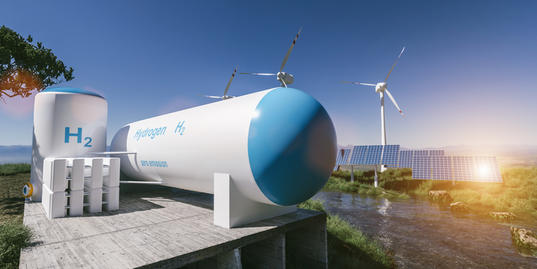States and regions have an important role to play in achieving a low carbon industry future by utilising disruptive innovation and sustainable hydrogen.
Research published today by the Under2 Coalition’s Industry Transition Platform, in partnership with low carbon energy consultancy, Element Energy, outlines analysis of industrial innovation options, infrastructure requirements for a hydrogen economy, and shows the crucial role that states and regions can play in the industrial sector.
As part of the Industry Transition Platform, 11 states and regions from across Europe and North America have received research support to equip them to develop strategies for lowering emissions from their industrial sectors. By tackling the industrial sector - one of the most difficult sectors to make emissions cuts – these governments are taking on some of the most difficult climate challenges – and are demonstrating climate leadership.
The research was performed on behalf of the Climate Group by consultancy Element Energy and resulted in two tailored research pieces with recommendations for the Industry Transition Platform participating governments that also can be applied to other Under2 Coalition members.
- Fostering Disruptive Innovation: opportunities – in technologies, policies, and finance models – available to subnational governments to support industrial emissions reduction
- Sustainable Hydrogen: methods for hydrogen transportation and storage to facilitate a sustainable hydrogen economy
Opportunities exist for subnational governments to play a critical role in supporting an economic recovery while promoting a green transition which enables industrial decarbonisation and avoids offshoring of emissions.
The disruptive innovation options outlined in the research paper are anticipated to impact low carbon markets in the next two decades.
- Technology opportunities: fuel switching, carbon capture utilisation and storage, innovative process changes, industry 4.0.
- Policy opportunities: green / public procurement, border tariff adjustments, embodied carbon disclosure and caps, circular economy and low-carbon market development.
- Finance / Business model opportunities: contract-for-difference, carbon capture support mechanisms, access-over-ownership, and green/climate bonds.
In addition, targeted recommendations were developed for the future industrial decarbonisation planning of each region, based on the current industrial landscape of the regions and analysis of opportunities for disruptive technologies, policies, and finance/business models.
Many governments are currently exploring the regional and national opportunities for the adoption of hydrogen in sectors such as transport, industry, power and buildings. The Sustainable Hydrogen research paper highlighted:
- Infrastructure requirements for the transportation of hydrogen in different forms.
- Potential pipeline routes and repurposing potential of existing infrastructure as well as shipping routes.
- Policies and programmes already available to support transition.
Establishing hydrogen value chains at the regional scale requires parallel analysis of transportation and storage options, particularly as the distance between supply and demand points grows. To enable the interregional trade of hydrogen, it is important for regions to accelerate collaboration, define viable transportation routes, and establish cross-border business models which bring certainty both in terms of timeframes for hydrogen growth as well as hydrogen quantities to be expected.
The industrial sector accounts for one-fifth to one-quarter of global CO2 emissions. Global industrial energy consumption could be reduced by about a quarter if the best available technologies were adopted to improve efficiency[1].
We invite you to join us for the first Under2 Coalition Industry Transition Platform (ITP) webinar where the research partner will be on hand to answer questions about the reports and research. Click here to register for the webinar, or get in touch with Rebecca Ellis, Senior Project Officer, Under2 Coalition, for more information.
About:
The Industry Transition Platform is a joint project of the Climate Group and the German state government of North Rhine-Westphalia, funded by Stiftung Mercator. It works with governments from highly-industrialised regions to develop strategies to cut industry emissions, while supporting growth, job creation and prosperity.
Element Energy is a leading low carbon energy consultancy specialising in technical and strategic insights across the industry, CCUS, buildings, transport, hydrogen and energy networks/systems sectors.
[1] Global energy transformation (p.38)
